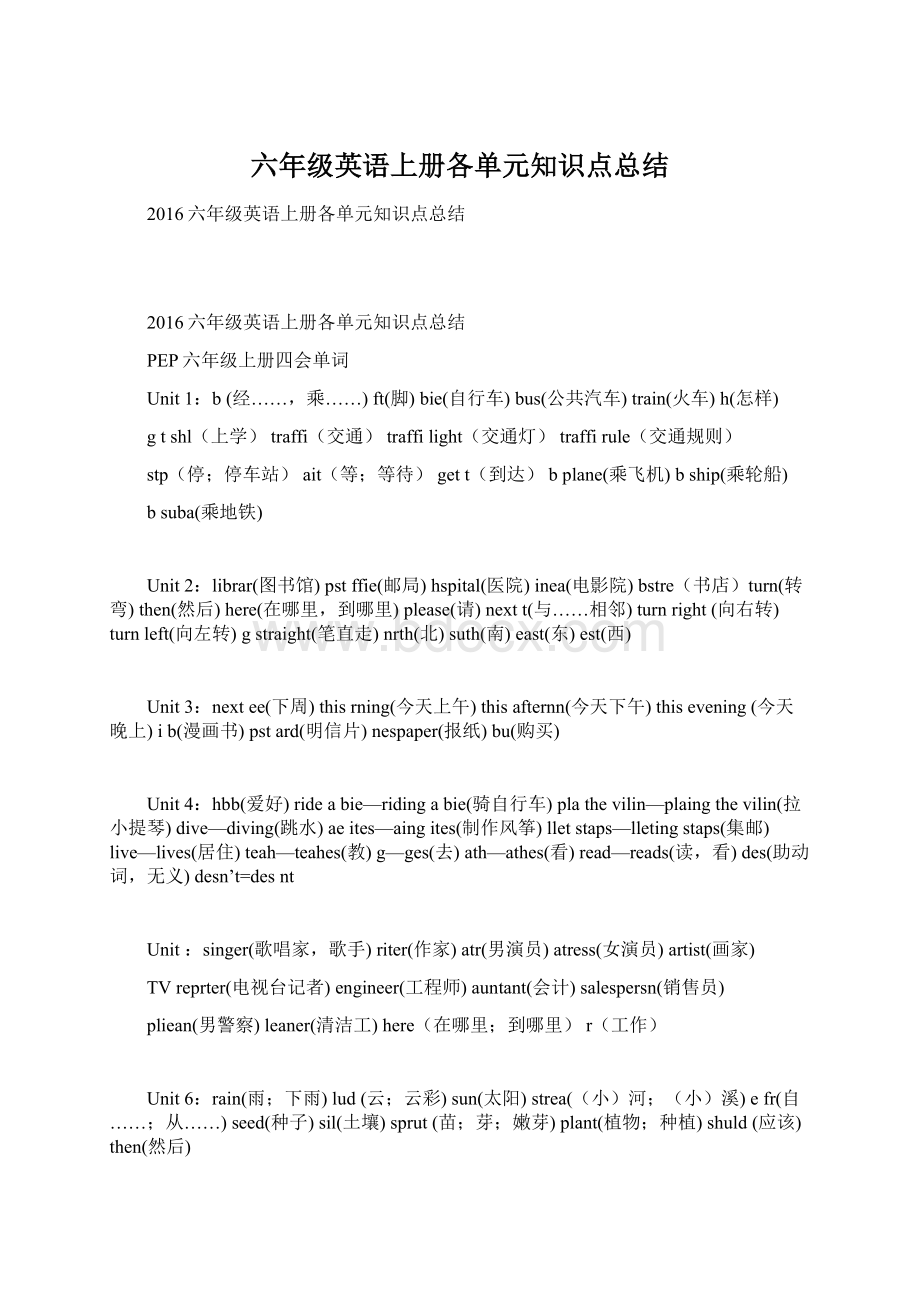六年级英语上册各单元知识点总结.docx
《六年级英语上册各单元知识点总结.docx》由会员分享,可在线阅读,更多相关《六年级英语上册各单元知识点总结.docx(6页珍藏版)》请在冰豆网上搜索。

六年级英语上册各单元知识点总结
2016六年级英语上册各单元知识点总结
2016六年级英语上册各单元知识点总结
PEP六年级上册四会单词
Unit1:
b(经……,乘……)ft(脚)bie(自行车)bus(公共汽车)train(火车)h(怎样)
gtshl(上学)traffi(交通)traffilight(交通灯)traffirule(交通规则)
stp(停;停车站)ait(等;等待)gett(到达)bplane(乘飞机)bship(乘轮船)
bsuba(乘地铁)
Unit2:
librar(图书馆)pstffie(邮局)hspital(医院)inea(电影院)bstre(书店)turn(转弯)then(然后)here(在哪里,到哪里)please(请)nextt(与……相邻)turnright(向右转)turnleft(向左转)gstraight(笔直走)nrth(北)suth(南)east(东)est(西)
Unit3:
nextee(下周)thisrning(今天上午)thisafternn(今天下午)thisevening(今天晚上)ib(漫画书)pstard(明信片)nespaper(报纸)bu(购买)
Unit4:
hbb(爱好)rideabie—ridingabie(骑自行车)plathevilin—plaingthevilin(拉小提琴)dive—diving(跳水)aeites—aingites(制作风筝)lletstaps—lletingstaps(集邮)live—lives(居住)teah—teahes(教)g—ges(去)ath—athes(看)read—reads(读,看)des(助动词,无义)desn’t=desnt
Unit:
singer(歌唱家,歌手)riter(作家)atr(男演员)atress(女演员)artist(画家)
TVreprter(电视台记者)engineer(工程师)auntant(会计)salespersn(销售员)
pliean(男警察)leaner(清洁工)here(在哪里;到哪里)r(工作)
Unit6:
rain(雨;下雨)lud(云;云彩)sun(太阳)strea((小)河;(小)溪)efr(自……;从……)seed(种子)sil(土壤)sprut(苗;芽;嫩芽)plant(植物;种植)shuld(应该)then(然后)
PEP六年级上册三会单词
apairf(一双)alas(总是;一直)ditinar(词典;字典)agazine(杂志)trr(明天)exusee(对不起)fun(快乐;乐趣)gttheinea(去看电影)l(看上去)nth(月份;月)readaagazine(阅读杂志)sieneuseu(科学博物馆)shestre(鞋店)sh(展览;演出;表演;节目)tae(乘坐)taeatrip(去旅行)tell(告诉)tnight(今晚)vapur(蒸汽;水汽)ant(想要)ith(同……;和……)n(知道)inute(分钟)again(再一次;又;再)
PEP六年级上册四会句型
Unit1
Hdugtshl,Sarah?
萨拉,你怎样去上学?
UsuallIgtshlnft通常我步行去上学。
SetiesIgbbie有时候,我骑自行车去。
HanIgettZhngshanPar?
我怎样能到达中公园?
uangbtheN1bus你可以乘1路公交车去。
Unit2
hereistheinea,please?
It’snexttthehspital请问,电影院在哪里?
它与医院相邻。
Turnleftattheinea,thengstraightIt’sntheleft在电影院处向左转,然后直行。
它在左边。
Unit3
hatareugingtdntheeeend?
周末你打算干什么?
I’gingtvisitgrandparentsthiseeend这个周末我打算拜访我的祖父母。
hereareugingthisafternn?
I’gingtthebstre今天下午你打算去哪里?
我打算去书店。
hatareugingtbu?
你打算买什么?
Iagingtbuaib我打算买一本漫画书。
Unit4
hat’surhbb?
你的爱好是什么?
Ilielletingstaps我喜欢集邮。
Helieslletingstaps,t他也喜欢集邮。
DessheteahEnglish?
N,shedesn’t她教英语吗?
不,她不教。
Dessheteahuath?
es,shedes她教你数学吗?
是的,她教数学。
Unit
hatdesurtherd?
你的妈妈是干什么的?
SheisaTVreprter她是一位电视工作者。
heredessher?
她在哪里上班?
Shersinashl她在一所学校上班。
Hdesshegtr?
她怎样去上班?
Shegestrbbus她坐公交车去上班。
Unit6
heredestherainefr?
Itesfrtheluds雨自哪里?
它自于云朵。
Hdudthat?
你怎样做那事呢?
hatshuldudthen?
接下,你应该做什么呢?
PEP六年级上册三会句型
1heisnear我的家很近。
2hatabutu?
你呢?
3Latthetraffilights看交通灯。
4Reeberthetraffirules记住交通规则。
Stpataredlight红灯停。
6aitataelllight黄灯等。
7Gatagreenlight绿灯行。
8anIgnft?
Sure,ifulieIt’sntfar我能步行去嘛?
当然,如果你喜欢。
它不远。
9hereisthe…?
It’snearthe…
10Exusee,istherea…nearhere?
es,thereis打扰一下,在这附近有没有一家…?
是的,有。
11Isitfarfrhere?
N,it’sntfar它离这儿远吗?
不,它不远。
12–Thanu–u’reele谢谢,不客气。
13hereisthe…?
…在哪里?
It’seast/est/suth/nrthfthe…它在…的东边,西边,南边,北边。
14henareuging?
Iagingat3’l你打算什么时候去?
我打算3点钟去。
1anhegithus?
Sure他能和我们一起去嘛?
当然。
16Let’sgtgether让我们一起去吧。
17ThereisastapshnSunda在星期天,有一个邮票展。
18SheisateaherSheteahesath她是一位老师,她教数学。
19DesurpenpalliveinShanghai?
你的笔友住在上海吗?
N,hedesn’tHelivesinBeiing不,他不住上海。
他住在北京。
20heredessher?
Shersinaarpan她在哪里上班?
她在一家汽车公司上班。
21Hdesshegtr?
Shegestrbbus她怎样去上班呢?
她坐公交车去上班。
22heredesthe…efr?
Itesfrthe……自于哪里?
它自于…
23Hantheaterbeevapur?
水如何能变成蒸汽呢?
Thesunshinesandtheaterbeesvapur在太阳的照射下,水就变成了蒸汽。
24Hdudthat?
你怎样做那事呢?
First,puttheseedsinthesil首先,把种子放进土壤里。
2It’seas它很简单。
26hatshuldudthen?
接下你应该做什么呢?
atertheInseveraldas,uanseeasprut给它们浇水,几天后,你就能看见一株幼苗。
27First,…Then,…Next,…Atlast,…首先,然后,接下,最后,
语法复习
一、现在进行时态(3种变化规律)
1直接加ing:
d—dingdra—draing—inganser—ansering
read—readinglisten—listeningfl—flingsing—singingpla—plaing
2去掉末尾的e加ing:
rite—ritingdane—daningtae—tainghave—havingae—aingride—ridingdive—diving
3双写末尾字母加ing:
get—gettingrun—runningsi—siingsit—sitting
put—putting
你正在干什么?
hatareuding?
I’anseringthephne
他/她/它正在干什么?
hatishe/she/itding?
He’s/She’s/It’s…
他(她、它)们正在干什么?
hataretheding?
Theare…
看到lie或lies后面的动词要加上ing
二、一般将时态(begingt/ill+动词原形)
表示一般将时的时间状语有:
thisrning,thisafternn,thisevening,trr,tnight,thiseeend,ntheeeend,nextee,nextnth,nextear,nexteeend
(今晚)你将要做什么?
hatareugingtd(thisevening)?
I’gingttheinea
I’gingtvisitgrandparents
你将什么时候去?
henareuging?
I’gingat7:
10
你将怎样去呢?
Hareuging?
I’gingbbus
今天下午你将要去哪里?
hereareugingthisafternn?
I’gingtthebstre
你将要买什么呢?
hatareugingtbu?
I’gingtbuaib
你将和谁一起去?
hareugingith?
I’gingithparents
三、第三人称单数后面的动词要加s或es
1一般情况加s,如:
read—reads;live—lives;pla—plas;sing—sings
2动词末尾以s,x,h,sh或部分以结尾的加es。
(记住本中出现的这几个:
athes,teahes,ges,des,ashes,passes)
3辅音字母+结尾的把变i再加es,如:
fl—flies;stud—studies
4特殊情况:
have--has
第三人称单数包括:
he;she;it;father/friend;A/Hangzhu等一个人名或地名。
例如:
Heliesdraingpitures
Shersinaarpan
Itesfrtheluds
fathergestrnft
LiLeiftenplasputergaesafterlunh
6一般疑问句记住:
前面助动词加了es,后面动词就不变化了。
例如:
DessheteahEnglish?
DesurpenpalliveinHangzhu?
四、不定冠词a和an的用法
a用于辅音因素开头的单词前;an用于元音因素开头的单词前。
(a,e,i,,u)
记住本中出现的要用an的单词:
anatr;anatress;anartist;anengineer;anauntant;anEnglishb;anrange;anapple;anldan
五、动词变化为表示职业或人的单词
1动词后面加er:
r—rer;teah—teaher;sing—singer;TVreprt—TVreprterlean—leaner
2动词后面加r:
at—atr;dtr
3末尾以e结尾的直接加r:
rite—riter;dane—daner;drive—driver
4动词后面加ist:
art—artist;tur—turist
职业男女有区别的:
警察pliean—pliean;演员atr—atress
六、8个疑问词
hih(哪一个)hat(什么)hen(什么时候)here(哪里)
hse(谁的)h(为什么)h(怎么样)h(谁)
七、人称代词和物主代词
I—(我—我的)u—ur(你;你们—你的;你们的)he—his(他—他的)she—her(她—她的)e—ur(我们—我们的)the—their(他们/她们/它们—他们的/她们的/它们的)
八、an后面加动词原形
hatanud?
Iantheeals
Heanflites
Sheanplathevilin